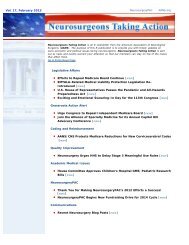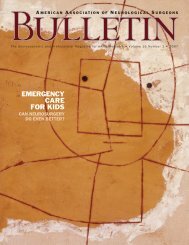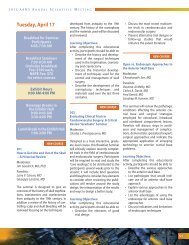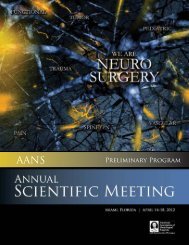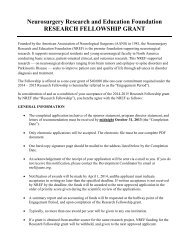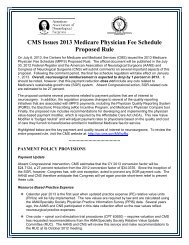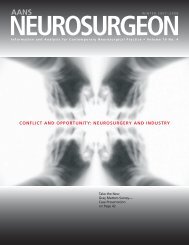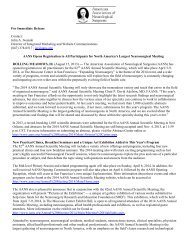view PDF - American Association of Neurological Surgeons
view PDF - American Association of Neurological Surgeons
view PDF - American Association of Neurological Surgeons
You also want an ePaper? Increase the reach of your titles
YUMPU automatically turns print PDFs into web optimized ePapers that Google loves.
P ATIENTS AFETY P ATRICK W. M C C ORMICK, M D<br />
Whom Does Credentialing Protect<br />
Medical Pr<strong>of</strong>essionalism Meets Hospital Board Protectionism<br />
After neurosurgeon Steve Cathey<br />
invested in the Arkansas Surgical<br />
Hospital—a private, for-pr<strong>of</strong>it 16-<br />
bed specialty hospital designed for<br />
orthopedic and neurosurgical spine care—<br />
his wife, gynecologist Janet Cathey, was<br />
threatened with revocation <strong>of</strong> privileges at<br />
Baptist Health Hospital in Little Rock.<br />
According to <strong>American</strong> Medical News, this<br />
action was possible because Baptist Health<br />
System’s board had “adopted a policy that<br />
mandates denial <strong>of</strong> initial or renewed staff<br />
privileges to any practitioner who, directly<br />
or indirectly, acquires or holds an ownership<br />
or investment interest in a competing<br />
hospital” and had extended the restriction<br />
to the immediate family members <strong>of</strong> anyone<br />
who invested in a competing hospital.<br />
Such economic-based criteria, however,<br />
are not among the goals for medical staff<br />
credentialing and privileging as defined by<br />
the Joint Commission on Accreditation <strong>of</strong><br />
Healthcare Organizations. Instead, the<br />
JCAHO goals center on quality patient care<br />
and safety and specifically state that the<br />
purpose <strong>of</strong> medical staff credentialing and<br />
privileging is to determine competency <strong>of</strong><br />
physicians, assess physical and mental ability<br />
<strong>of</strong> physicians to discharge patient care<br />
responsibilities and perform ongoing<br />
assessment <strong>of</strong> the safety and quality <strong>of</strong> care<br />
provided by physicians.<br />
JCAHO further asserts that the credibility<br />
<strong>of</strong> the credentialing process requires<br />
cooperation between the hospital governing<br />
body and medical staff through its<br />
appointed designees. The medical staff<br />
leadership designees make recommendations<br />
to the hospital governing body<br />
regarding a physician’s appropriateness for<br />
credentials and privileges. The hospital<br />
governing body must act on these recommendations<br />
and report back to the medical<br />
staff regarding its decisions and the<br />
underlying rationale.<br />
Patrick W.<br />
McCormick, MD,<br />
FACS, MBA,<br />
is a partner in<br />
Neurosurgical Network<br />
Inc., Toledo, Ohio.<br />
Thus, hospital credentialing and privileging<br />
are a medical staff function. As such,<br />
physicians who participate in this process<br />
are guided by the <strong>American</strong> Medical <strong>Association</strong><br />
Code <strong>of</strong> Medical Ethics, Opinion 4.07:<br />
The mutual objective <strong>of</strong> both the governing<br />
board and the medical staff is<br />
to improve the quality and efficiency<br />
<strong>of</strong> patient care in the hospital. Decisions<br />
regarding hospital privileges<br />
should be based upon the training,<br />
experience, and demonstrated competence<br />
<strong>of</strong> candidates, taking into<br />
consideration the availability <strong>of</strong> facilities<br />
and the overall medical needs <strong>of</strong><br />
the community, the hospital, and<br />
especially patients.... Physicians who<br />
are involved in the granting, denying,<br />
or termination <strong>of</strong> hospital privileges<br />
have an ethical responsibility to be<br />
guided primarily by concern for the<br />
welfare and best interests <strong>of</strong> patients<br />
in discharging this responsibility.<br />
The inclusion <strong>of</strong> this opinion in the Code<br />
<strong>of</strong> Medical Ethics underscores the integral<br />
role credentialing fulfills in the pr<strong>of</strong>essional<br />
social contract to ensure patient access to<br />
appropriate, safe and quality care. The AMA,<br />
as it notes in a recently adopted Council on<br />
Medical Service report, additionally has several<br />
existing policies that oppose loss or<br />
restriction <strong>of</strong> privileges based solely on economic<br />
factors.<br />
Despite the alignment <strong>of</strong> the JCAHO<br />
goals with the pr<strong>of</strong>essional medical code <strong>of</strong><br />
conduct as well as AMA policies opposing<br />
economic credentialing, the legal system has<br />
allowed healthcare delivery organizations to<br />
use credentialing to address market concerns<br />
over patient interests.<br />
Some hospitals have adopted policies to<br />
limit or effectively prohibit perceived competitive<br />
behavior by credentialed physicians.<br />
Targeted physician behaviors include<br />
failing to sign loyalty oaths, perform a<br />
defined percentage <strong>of</strong> procedures at a hospital,<br />
or admit a specific percentage <strong>of</strong> their<br />
patients to a hospital; referring patients out<br />
<strong>of</strong> an integrated system; accepting staff<br />
privileges or leadership positions at a competing<br />
hospital; and having financial interest<br />
in a competing healthcare delivery<br />
entity. These “competitive behaviors” have<br />
resulted in denial or revocation <strong>of</strong> physician<br />
hospital privileges.<br />
Legal Challenges to Economic<br />
Credentialing<br />
Hospital policies involving economic credentialing<br />
have been met by legal challenges<br />
on several grounds.<br />
In Mahan v. Avera St. Luke’s, the South<br />
Dakota Supreme Court stressed that the<br />
“continued economic viability <strong>of</strong> the hospital”<br />
is sufficient reason to deny privileges<br />
to physician applicants, and that<br />
such denials may be based on “any reasonable<br />
basis,” including “the common<br />
good <strong>of</strong> the public and the hospital.” This<br />
decision allows the credentialing process<br />
for physician hospital privileges to be<br />
used to erect barriers to competition,<br />
impeding function <strong>of</strong> competitive market<br />
forces and raising anticompetitive behavior<br />
concerns. Challenges to such behavior<br />
under Section 1 <strong>of</strong> the Sherman Act on<br />
balance have failed to prevail because it is<br />
difficult to demonstrate a conspiracy. This<br />
30 Vol. 15, No. 2 • 2006 • AANS Bulletin




